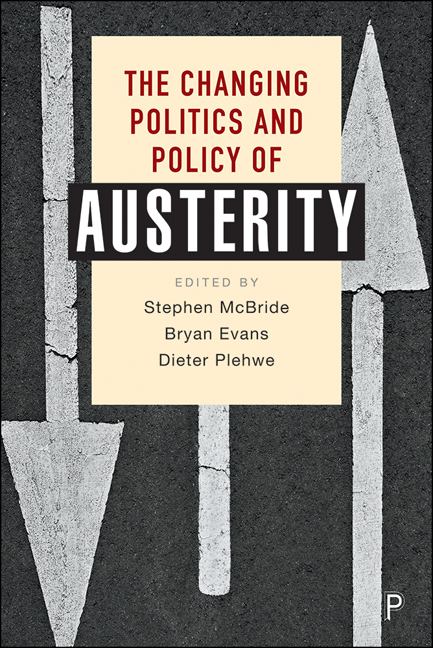Book contents
- Frontmatter
- Contents
- List of figures and tables
- Notes on contributors
- Acknowledgements
- Introduction
- PART I Austerity and the promotion of the private
- PART II Coping and casualties: labour and the social
- PART III Beyond coping: protest, pathologies and the development of real alternatives
- Conclusion
- Index
11 - Reducing the burden: international struggles against illegitimate debt
Published online by Cambridge University Press: 13 May 2022
- Frontmatter
- Contents
- List of figures and tables
- Notes on contributors
- Acknowledgements
- Introduction
- PART I Austerity and the promotion of the private
- PART II Coping and casualties: labour and the social
- PART III Beyond coping: protest, pathologies and the development of real alternatives
- Conclusion
- Index
Summary
Austerity measures have faced one of the biggest and most dynamic waves of protest in recent decades. While a pluralism of issues converged in the occupied squares of 2011, such as stagnating wages, housing rights, political corruption and so on, debt constituted one of the pivotal themes of claim-making. From the sudden contraction of financial markets precipitating household debt traps, bankruptcies and evictions, to the devastating effects of austerity justified by sovereign debt crises, the issue of debt reflected larger questions of democratic decision-making and economic life.
This brief chapter aims to situate debt-centred mobilization and the issue of debt within more and less recent anti-austerity struggles. I will first introduce some general issues, features and concepts of social movement studies, and then trace lineages of debt-centred resistance from the Southern Debt Crisis to mobilization after the North Atlantic Financial Crisis.
Due to lack of space and time, and looking at the variety of interesting chapters by other participants to this publication, this text will centre less on the target of said movements (that is, debt and austerity) than on the movements themselves. Such an approach profits from the field of social movement studies and thereby reminds us to always contextualize our analyses and critiques of austerity with the limits of top-down policy implementation and the resistance of disruptive action against policy consolidation (Huke et al 2015).
Social movement studies as a field defines itself by looking at the dynamic margins of established polities for social and political change. The field emerged as a critique of structural functionalism and of (economistic and deterministic readings of) Marxism (Melucci 1980).
Marxism(s) has faced a general crisis in the social sciences since the 1970s, as the diffusion of class compromises and the rise of cultural movements supposedly transformed the material reality in which Marxism emerged. Mainstream Marxism strongly focused on labour-capital relations and the mode of production as the central concepts for social movements, while ‘new’ social movement scholars argued that the demise of Fordism and industrial capitalism precipitated new societal cleavages, mainly centred on autonomy and identity (Melucci 1980; Touraine 1981; Offe 1985).
- Type
- Chapter
- Information
- The Changing Politics and Policy of Austerity , pp. 230 - 247Publisher: Bristol University PressPrint publication year: 2021



